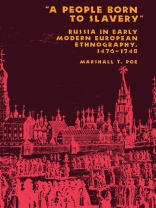Many Americans and Europeans have for centuries viewed Russia as a despotic country in which people are inclined to accept suffering and oppression. What are the origins of this stereotype of Russia as a society fundamentally apart from nations in the West, and how accurate is it?
In the first book devoted to answering these questions, Marshall T. Poe traces the roots of today’s perception of Russia and its people to the eyewitness descriptions of sixteenth- and seventeenth-century European travelers. His fascinating account—the most complete review of early modern European writings about Russia ever undertaken—explores how the image of ‘Russian tyranny’ took hold in the popular imagination and eventually became the basis for the notion of ‘Oriental Despotism’ first set forth by Montesquieu.
Poe, the preeminent scholar of these valuable primary sources, carefully assesses their reliability. He argues convincingly that although the foreigners exaggerated the degree of Russian ‘slavery, ‘ they accurately described their encounters and correctly concluded that the political culture of Muscovite autocracy was unlike that of European kingship. With his findings, Poe challenges the notion that all Europeans projected their own fantasies onto Russia. Instead, his evidence suggests that many early travelers produced, in essence, reliable ethnographies, not works of exotic ‘Orientalism.’
Tentang Penulis
Marshall T. Poe is a Lecturer in History in the Department of Government and Society at the University of Limerick, Ireland.












